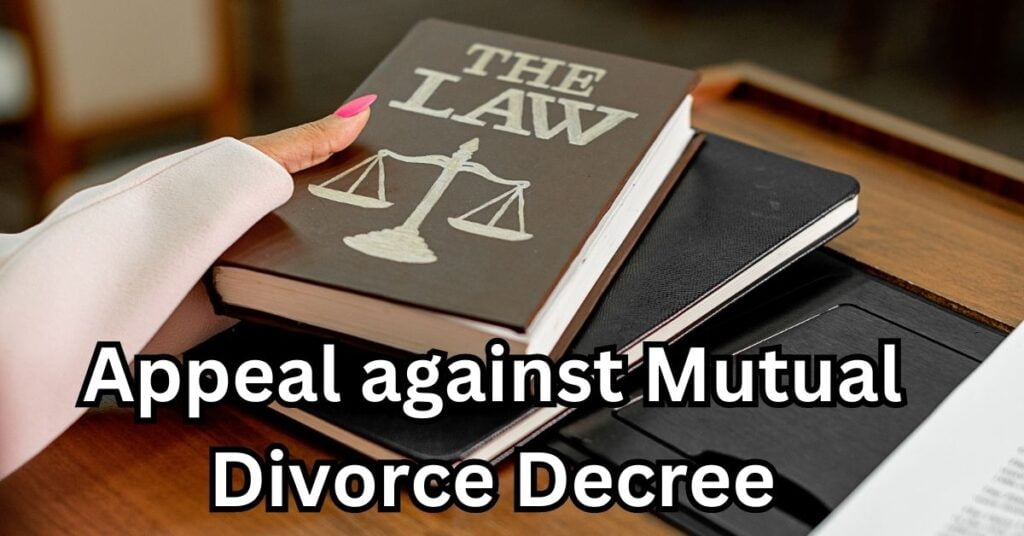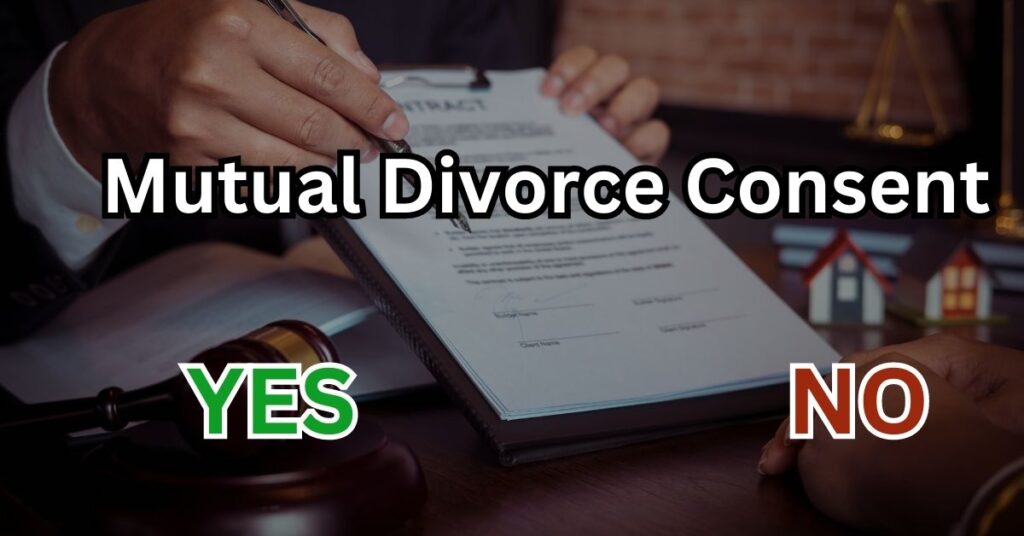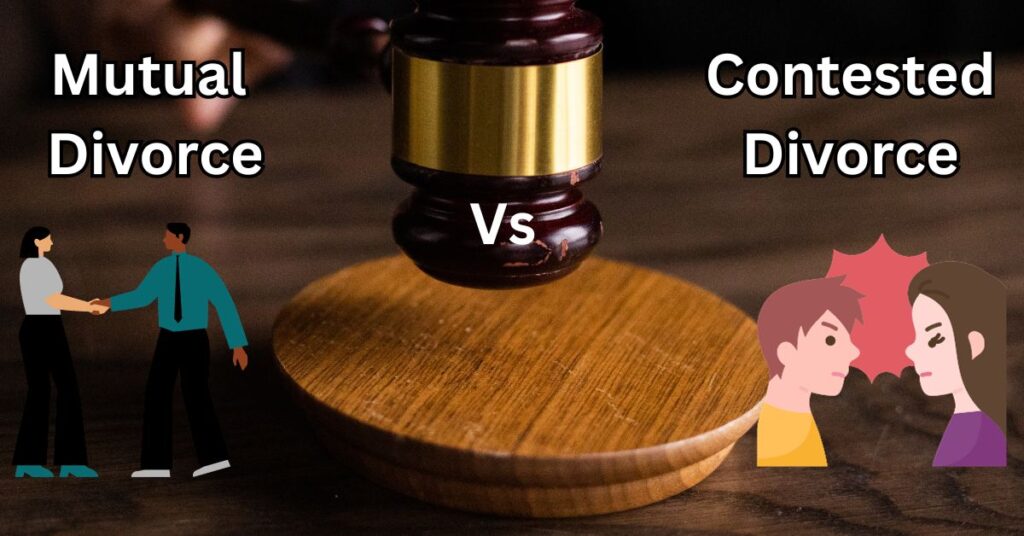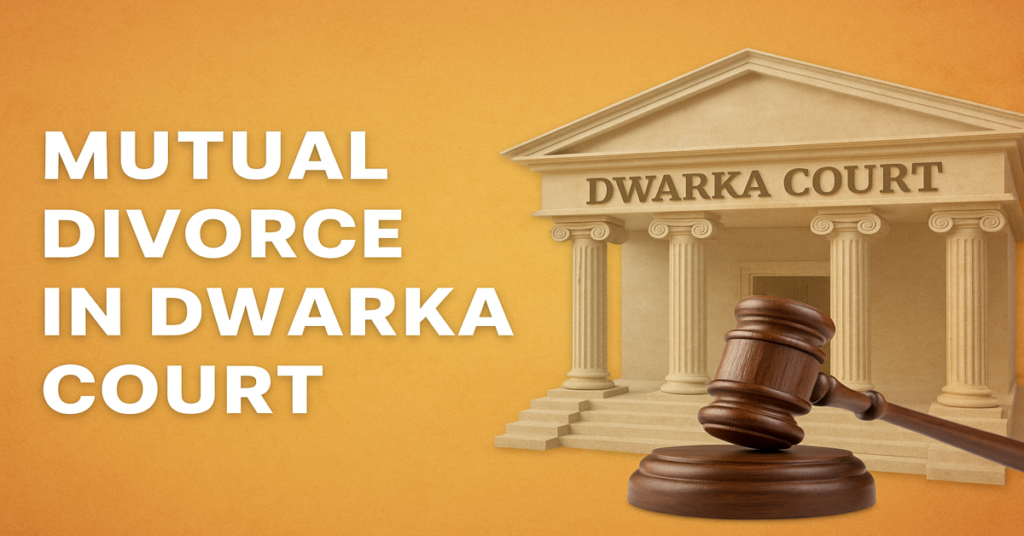Divorce can be classified into two types: mutual and contested. Mutual divorce is when both spouses agree to end the marriage and file a joint petition, reaching a settlement on various issues. Contested divorce is when one spouse initiates divorce proceedings without the other’s consent, and the court decides on matters like custody and property division. Mutual divorce is faster and amicable, while contested divorce is lengthier and often more adversarial.
Divorce proceedings can be complex, and there may be situations where one party wishes to change the nature of the divorce case from mutual to contested, or vice versa. In this article, we will explore the limitations and possibilities regarding converting divorce cases, as well as the withdrawal of consent and challenging of mutual divorce decrees.
Table of Contents
1. Key Differences Between Mutual Divorce and Contested Divorce
| Mutual Divorce | Contested Divorce | |
| Consent | Both parties must consent to the divorce | Consent of both parties is not required |
| Cooperation | Parties work together to reach a settlement | Parties may not cooperate or agree on terms |
| Legal Process | Generally less time-consuming and costly | Often more time-consuming and costly |
| Court Involvement | Minimal court involvement | More court hearings and proceedings |
| Settlement Agreement | Parties negotiate and agree on division of assets | Court decides on division of assets |
| Disputes and Issues | Parties resolve disputes amicably | Disputes and issues may require court rulings |
| Emotional Impact | Generally less emotionally taxing | May involve heightened emotional stress |
| Possibility of Appeal | Limited to challenging the consent or agreement | Possibility to appeal court decisions |
| Legal Representation | Parties may choose to have separate lawyers | Each party need to have their own lawyer |
2. Can a Mutual Divorce Case be Changed to a Contested Divorce Case?
In simple terms, a mutual divorce case cannot be converted into a contested divorce case as per the prevailing legal provisions. If both parties initially agreed to pursue a mutual divorce, but one of the spouses has now changed their mind, the alternative option is to file a separate case for contested divorce. It is important to note that in such a scenario, the pending mutual divorce case would be closed since the fundamental requirement of both parties willingly seeking a divorce is no longer met.
3. Can a Mutual Divorce Case be Changed to a Contested Divorce Case?
Similarly, a contested divorce case cannot be converted into a mutual divorce case under the existing legal framework. However, if both parties agree to a mutual divorce during the pendency of a contested divorce case, it is possible to file a separate case for mutual divorce and subsequently withdraw the contested divorce case. This route allows the parties to switch from a contested divorce to a mutual one, provided both spouses are in agreement.
3. Can a Contested Divorce Case be Changed to a Mutual Divorce Case?
In simple terms, a mutual divorce case cannot be converted into a contested divorce case as per the prevailing legal provisions. If both parties initially agreed to pursue a mutual divorce, but one of the spouses has now changed their mind, the alternative option is to file a separate case for contested divorce. It is important to note that in such a scenario, the pending mutual divorce case would be closed since the fundamental requirement of both parties willingly seeking a divorce is no longer met.

4. Challenging a Mutual Divorce Decree
Once a mutual divorce has been decreed by the court, it cannot be canceled, reversed, or challenged solely on the grounds of one party changing their mind. The mutual divorce decree is granted when both parties consent to the divorce. However, if you believe that your consent was obtained through fraud or misrepresentation, where you did not genuinely agree to the divorce, you may have a basis for challenging the mutual divorce decree. It is crucial to gather evidence and seek legal advice to determine the viability of challenging the decree.
5. Withdrawal of Consent in a Mutual Divorce
In the case of a mutual divorce, either party has the right to withdraw their consent for divorce before the recording of the statement of parties for the second motion. The essential condition for a mutual divorce is that both parties must be willing to dissolve the marriage throughout the judicial process. Hon’ble Supreme Court’s Judgement in Sureshta Devi vs. Om Prakash can be referred here.
The recording of the statement of parties for the second motion is typically the final step in the mutual divorce proceedings. If a spouse initially consented to the divorce but later changes their mind before the recording of the statement of parties for the second motion, they can withdraw their consent. However, if the statement of parties for the second motion has already been recorded, it is too late to withdraw consent, and the divorce process will continue as per the mutual agreement.

Conclusion
In divorce cases, it’s crucial to understand the limitations and possibilities concerning the conversion of divorce types and the challenges associated with mutual divorce decrees. While a mutual divorce case cannot be changed to a contested one or vice versa, separate legal proceedings can be initiated based on the new circumstances. Additionally, the withdrawal of consent and the challenging of mutual divorce decrees have their own considerations and requirements. Seeking the guidance of a qualified family law attorney is recommended to navigate the complexities of divorce proceedings effectively.




